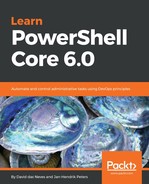The ability to connect to package management systems in PowerShell, which started with version 5, has made the deployment of code to machines very easy. By connecting to several internal and external repositories, PowerShell can be extended with modules, DSC resources, scripts, and functions.
But not only PowerShell users benefit from a solid package management solution. Developers often require those kinds of systems as well. As DevOps-minded people, we can immediately see the benefit of hosting not only PowerShell modules, but also NuGet packages for .NET libraries, Maven for Java, RubyGems, npm for Node.js, and more:

To put things into perspective, let's revisit the previous talks on this topic, where he shared this overview with the community: the end user has access to several cmdlets that access the core package management cmdlet, which serves as an API for several package management providers who implement the functionality required to add and remove packages.
The package providers can access several different repositories, which can be hosted on-premises or online. They serve as central repositories for storing PowerShell modules, binary packages, Node.js modules, RubyGems, and more.
